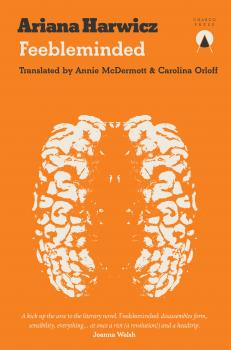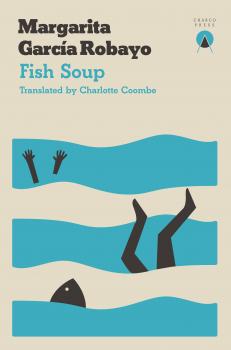Ingram
Все книги издательства IngramFeebleminded
In Feebleminded , Harwicz drags us to the border between fascination and discomfort as she explores aspects of desire, need and dependency through the dynamics between a mother and her daughter, searching through their respective lives to find meaning and define their own relationship. Written in a wild stream of consciousness narration in the best tradition of Virginia Woolf and Nathalie Sarraute, and embedded in a current trend of elusive violence so ingrained in contemporary Latin American fiction, Feebleminded follows the pair on a roller coaster of extreme emotions and examinations into the biographies of their own bodies where everything – from a childhood without answers to a desolate, loveless present – has been buried. Told through brief but extremely powerful chapters, this short lyrical novel follows Die, My Love as the second part in what Harwicz has termed an ‘involuntary trilogy’. An incredibly insightful interrogation on the human condition, desire and the burden of deep-rooted family mandates.
Loop
Winner PEN Translates Award (UK) I’m in the waiting area. They’ve just announced that the flight’s delayed. This situation is also the shortest possible summary of this story… Recovering from an unspecified accident, the narrator of Loop finds herself in waiting rooms of different kinds: airport departure lounges, doctors’ surgeries, and above all at home, awaiting the return of her boyfriend, who has travelled to Spain following the death of his mother. Loop is a love story told from the perspective of a contemporary Penelope who, instead of weaving and unravelling her shroud, writes and erases her thoughts in her ‘ideal’ notebook. At once, funny and thought-provoking, her thoughts range from her stationery preferences to the different scales on which life is lived, while a cast of unlikely characters cross the page, from Proust to a mysteri- ous dwarf, from a dreamy cat to David Bowie singing ‘Wild is the Wind’. Written in an assured, irreverent style, Loop is the journal of an absence, one in which the most minute or whimsical observations open up universes. Combining aphoristic fragments with introspective narrative, and evoking Italo Calvino and Fernando Pessoa in its playfulness and wry humour, this original reflection on relationships, solitude and the purpose of writing offers a glimpse of contemporary life in Mexico City, while asking what it really means to find our place in the world.
Trout, Belly Up
In this highly original collection of interconnected short stories, the Guatemalan countryside is ever-present, a place of timeless peace yet also riven by sudden violence. The stories provide glimpses into the life of Don Henrik, a good man struck time and again by misfortune, as he confronts the crude realities of farming life. Over the course of these episodes we meet merciless entrepreneurs, hitmen, drug dealers and fallen angels, all wanting their piece of the pie. Told with precision and a stark beauty, in a style that recalls Hemingway, Trout, Belly Up is a unique ensemble of beguiling, disturbing stories set in the heart of the rural landscape in a country where violence is never far from the surface. Finalist for the Gabriel García Marquez Short Story Prize
The Distance Between Us
‘This is an impressive book. In writing it the author demonstrates great talent, as well as great courage.’ —Mario Vargas Llosa If I succeed in understanding who he was before I was born, perhaps I will be able to understand who I am now that he is dead… In this sprawling family saga stretching across Latin America, a son embarks on a journey to understand his complex relationship with his father and how it shaped the man he is today. Recalling Gabriel García Márquez’s One Hundred Years of Solitude and Isabel Allende’s House of the Spirits , the renowned journalist and writer Renato Cisneros probes deep into his own family history to try to come to terms with his father, General Luis Federico ‘The Gaucho’ Cisneros, a leading, controversial figure in the oppressive military regime that held power in Peru during the 1970s and 1980s, a tortuous period marked by state-sanctioned terrorism and the rise of the Shining Path. Selling over 35,000 copies in Peru alone, The Distance Between Us is at once excruciating in its honesty and deeply moving in its universal relevance. Selected for a slew of international prizes, it is now available in English for the first time.
Fireflies
How do we even begin to narrate the history of the world? Where do we start, and where do we end? Fireflies is Sagasti’s bold and original attempt to answer these questions. Roaming across time and geography, he lights on an eclectic array of characters and events that at first glance seem unrelated, and teases out their stories to reveal unexpected points of contact between them. Stanley Kubrick, Joseph Beuys, Antoine de Saint-Exupéry, Neil Armstrong, Ludwig Wittgenstein, the Beatles, Japanese poets, Brazilian priests, Russian cosmonauts and many more cross these pages, and Sagasti finds common threads that weave them together into a single narrative. The fireflies themselves perhaps provide the key to understanding this book. They become a metaphor for the resistance of certain luminous moments, certain twinkling fragments of history, to the passing of time. They remind us that events do not always simply disappear neatly into the darkness, but rather remain, floating in the air, lighting up the night sky indefinitely. Sagasti shows us that the present moment, like this novel, is a tapestry woven of a multiplicity of times. Using his unique, poetic and keenly observant style, Sagasti transforms the accidents of history into a single, lyrical constellation, and for the reader it is an extraordinary sight.
The President’s Room
In a nameless suburb in an equally nameless country, every house has a room reserved for the president. No one knows when or why this came to be. It’s simply how things are, and no one seems to question it except for one young boy. The room is kept clean and tidy, nobody talks about it and nobody is allowed to use it. It is for the president and no one else. But what if he doesn’t come? And what if he does? As events unfold, the reader is kept in the dark about what’s really going on. So much so, in fact, that we begin to wonder if even the narrator can be trusted… Ricardo Romero has been compared to Franz Kafka and Italo Calvino, and we see why in this eerie, meditative novel narrated by a shy young boy who seems to be very good at lying about the truth. Following in the footsteps of Julio Cortázar and a certain literary tradition of sinister rooms (such as Dr Jekyll’s laboratory), The President’s Room is a mysterious tale based on the suspicion that a house is never just one single home.
Fish Soup
From internationally acclaimed author Margarita García Robayo comes Fish Soup , a unique collection comprising two novellas and the book of short stories Worse Things (winner of the prestigious Casa de las Américas Prize). Set on the Caribbean coast of Colombia, Waiting for a Hurricane follows a girl obsessed with escaping both her life and her country. Emotionally detached from her family, and disillusioned with what the future holds if she remains, she takes ever more drastic steps to achieve her goal, seemingly oblivious to the damage she is causing both herself and those around her. The seven tales of Worse Things offer snapshots of lives in turmoil, frayed relationships, dreams of escape, family taboos and rejection of and by society. García Robayo paints in just enough detail to evoke the intensity of the situation, while leaving it to the reader to unravel the true meaning of events. Sexual Education examines the attempts of a student to tally the strict doctrine of abstinence taught at her school with the very different moral norms that prevail in her social circles. Semi-autobiographical, the frank depiction of these opposing forces makes it deeply unsettling. Throughout the collection, García Robayo’s signature style blends cynicism and beauty with a rich vein of dark humour. The prose is at once blunt and poetic as she delves into the lives of her characters, who simultaneously evoke sympathy and revulsion, challenging the reader’s loyalties throughout the remarkable universe that is Fish Soup .
Die, My Love
Man Booker International Prize 2018 —Longlist In a forgotten patch of French countryside, a woman is battling her demons: embracing exclusion yet wanting to belong, craving freedom whilst feeling trapped, yearning for family life but wanting to burn the entire house down. Given surprising leeway by her family for her increasingly erratic behaviour, she nevertheless feels ever more stifled and repressed. Motherhood, womanhood, the banality of love, the terrors of desire, the brutality of ‘another person carrying your heart forever’: Die, My Love faces all this with a raw intensity. It’s not a question of if a breaking point will be reached, but rather when, and how violent a form will it take? It’s impossible to come out unscathed from reading Ariana Harwicz. The language of Die, My Love cuts like a scalpel even as it attains a kind of cinematic splendour, evoking the likes of John Cassavetes, David Lynch and John Ford. In a text that explores the destabilising effects of passion and its absence, immersed in the psyche of a female protagonist always on the verge of madness (in the tradition of Sylvia Plath and Clarice Lispector), Harwicz moulds language, submitting it to her will in irreverent prose. Bruising and confrontational, yet anchored in an unapologetic beauty and lyricism, Die, My Love is a unique reading experience that quickly becomes addictive.
Resistance
Winner of the Jose Saramago Prize (Portugal), Jabuti Prize (Brazil) and Anna Seghers' Prize (Germany), and a EnglishPEN Translates Award (UK), this is an impressive work by one of Brazil's rising literary stars. An unnervingly timely novel given the recent election of a far right President (Jair Bolsonaro) in that country, who has been nicknamed the 'Trump of the Tropics'. In the UK Fuks has already garnered media attention with interviews and essays for the likes of The Guardian and BBC World Service Cultural frontline. Already a favourite at Brazos.









